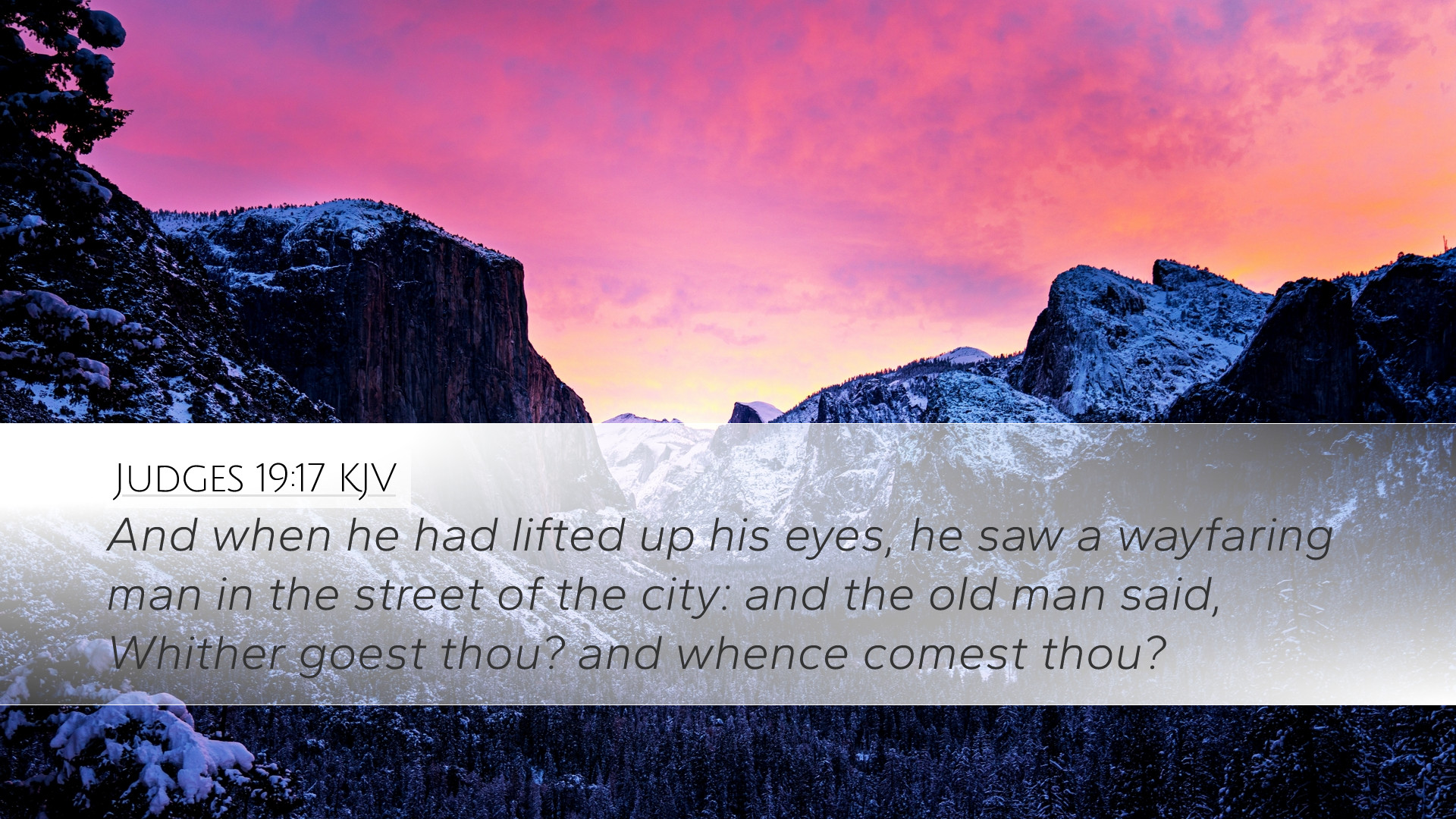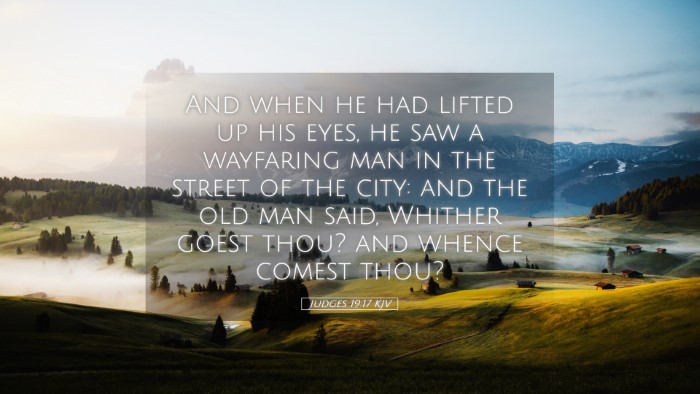Commentary on Judges 19:17
Verse Consideration: Judges 19:17 states, “And when he saw the host of the city, he said unto the servant, ‘Who are these?’ And the servant said, ‘They are the men of this city, - they are Benjamites.’” This verse is pivotal in understanding the moral degradation and social dynamics within Israel during the time of the judges. It sets the stage for the ensuing chaos and conflict.
Historical Context
The Book of Judges unfolds a period marked by political fragmentation and moral decline in Israel. After the death of Joshua, each tribe operated independently, leading to a decline in collective identity and mutual accountability. This is evident in the events leading up to Judges 19, where the Levite's concubine signifies not just personal tragedy but reflects the collective moral failure of the people.
Analysis of Key Themes
-
Social Breakdown:
In Judges 19, social alliances and responsibilities are dismantled. The Levite’s journey to Bethlehem, and the subsequent events, illustrate a society where hospitality and safety are compromised. The lack of communal responsibility among the tribes of Israel is evident in their failure to protect the Levite and his concubine.
-
Judgement and Accountability:
Judges 19 also introduces the theme of God's forthcoming judgment as a consequence of Israel's actions during this dark period. The Levite’s encounter with the Benjamites foreshadows the disastrous civil war. The Benjamites here symbolize the very evil that proliferates when society strays from God's laws.
-
Identity and Culture:
The mention of the Benjamites acts as a stark reminder of the cultural identity of the tribes of Israel. They were once intertwined with national heritage and covenant promises but are now degenerated through immoral conduct. This reflects a broader narrative of identity crisis among God’s people.
Commentary Insights
Matthew Henry provides a comprehensive analysis that highlights the alarming moral atmosphere. He reflects on the need for godly order and how the failure of each tribe to uphold their responsibilities results in chaos. Henry notes the importance of understanding the social structure and the ethical implications of hospitality in ancient Israel.
Albert Barnes emphasizes the significance of the Levite’s experience as an indictment against the society around him. He draws attention to the active moral decay evidenced by the special mention of the Benjamites. Barnes points out that the Levite's inquiry into the identity of the city’s inhabitants underscores their role in the unfolding drama—they are no longer protectors but potential perpetrators.
Adam Clarke analyzes the sociocultural ramifications of the events leading to this verse. He stresses the concept of a ‘hostile welcome,’ where the very fabric of hospitality is unraveled, leading to dire consequences. Clarke’s insight into the communal responsibilities helps us grasp how the fate of individuals is intertwined with that of their communities.
Theological Reflections
The examination of Judges 19:17 invites significant theological reflections for contemporary readers:
-
The Nature of God’s Justice:
The unfolding narrative serves as a reminder of divine justice and mercy, showcasing the serious ramifications of sin within a community. God’s patience is coupled with His eventual judgment.
-
Call to Holiness:
This passage exhorts readers to live in holiness and community interdependence, reflecting the character of God while practicing love and hospitality among one another.
-
The Essence of Community:
Judges 19:17 illustrates the crucial role of community in safeguarding righteousness. The societal collapse depicted urges believers to foster connections grounded in accountability and mutual respect.
Practical Applications
For pastors, students, theologians, and Bible scholars, this passage reinforces the importance of contextualizing biblical narratives within our modern communities:
-
Pursuing Justice within the Community:
This verse should motivate us to be agents of change in our communities, emphasizing the importance of hospitality, welcome, and care for the vulnerable.
-
Fostering Accountability:
It advocates for establishing protocols that ensure safety and ethics within our congregations and social circles.
-
Encouraging Open Dialogue:
This text invites discussions on moral issues in our society, reflecting on how we can embody Christ-like values in contemporary settings.
Conclusion
Judges 19:17 serves not only as a historical account but as a profound theological reflection on the nature of morality, community, and divine justice. As we grapple with its implications, let us strive to mirror the conscientiousness and collective responsibility that God desires in His people.


